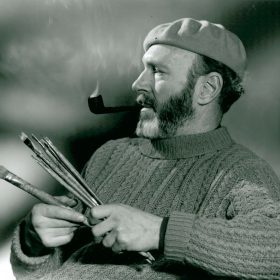The three jugs were painted in Cyprus where the artist’s great friends from Edinburgh, John Guthrie and his wife Vivian Duncan had moved in the early fifties. The heavy earthenware vessels had not changed in design or character for millennia and their rich terracotta becomes the dominant colour in the composition, enlivened by a pair of oranges, no doubt picked from the garden. His work at this time is characterised by a very heavy impasto, a vigorous kind of action painting which recall Auerbach and Kossoff.

Denis Peploe was born in 1914, the second son of the celebrated Scottish Colourist S J Peploe. Denis Peploe enrolled at Edinburgh College of Art at the age of seventeen where he was a contemporary of Wilhelmina Barns-Graham and Margaret Mellis. He won post-diploma scholarships to Paris and Florence and took advantage of opportunity to travel extensively in Spain, Italy and Yugoslavia. He first exhibited at The Scottish Gallery in 1947, to critical acclaim. The Glasgow Herald critic responded to the exhibition, saying he was “an artist born fully armed”; and The Bulletin critic wrote: “the general impression of the exhibition is that we have in Denis Peploe a vital and adventurous painter”. Reviewers never avoided mention of his father, and though one couldn’t confuse their work there were similarities in their approaches: each picture was a response to a particular subject, either intellectual or emotional. His son, Gallery Director, Guy Peploe explains:
‘While he was intimately exposed to the mainstream of European art he remained better defined as an artist who responded directly to his subject, en plein air or in the studio. Here the challenge was a live model, or the intellectual exercise of reinvigorating the still life subject. His work remained free of political or art-world references but was at the same time formed by the century of modernism, the times of unprecedented turmoil and change to which he belonged. His response was to cleave to the idea that art was important, even redemptive and that it could somehow describe a better, or more vital place.’
We would be delighted to hear from you if you are considering selling any works by Denis Peploe.